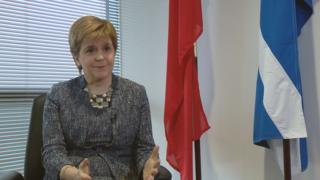Sturgeon aims to boost Scots-China trade with visit

First Minister Nicola Sturgeon is to visit China to "showcase Scottish business and companies" in a bid to boost exports.
Ms Sturgeon will begin a five-day visit on Monday which also aims to build tourism and academic links.
She said she would raise the issue of human rights in China, having been briefed by Amnesty International.
Amnesty urged the Scottish government to do full background checks on any Chinese firms it signed deals with.
It said this was necessary to ensure the companies - many of which are state-owned - were not involved in human rights abuses in China, which it said were among the worst in the world.
As part of the visit, Ms Sturgeon announced a £750,000 investment to give Scottish students the chance to live and study in China. The cash will go to the Confucius Institute for Scotland's Schools (CISS) Scholarship Programme.
The institute has faced criticism in the past for its links to the Chinese education programme, which is being monitored by the FBI after concerns over censorship and academic freedom.
The first minister last visited China in 2015. Speaking to BBC Scotland ahead of the latest trip, she said there had been "stunning successes" in Scottish-Chinese relations in the intervening years, which she was aiming to build on.
She said: "In the last year alone, Scottish exports to China have increased by 40%, which is driven largely by food and drink and whisky in particular but reflects and underlying strength in our exports to China.
"One of the things I'll be seeking to do when I'm there is looking for opportunities for our companies to export more of their goods and services.
"We're also seeing more students from China coming to study in Scotland, over 9,000 now will study in Scotland. And the other area where there has been quite remarkable growth is in Chinese tourism - I think over the last decade the spend by Chinese tourists in Scotland has increased by something like 400%. It's really remarkable."
A political row broke out in 2016 over an investment deal Ms Sturgeon signed with state-backed Chinese companies. It was initially said to be worth up to £10bn, but ultimately collapsed - with the government blaming a "climate of hostility" from opposition parties.
The first minister signed a memorandum of understanding with SinoFortone and China Railway No. 3 Engineering Group at Bute House, but the pact came under intense scrutiny after concerns were raised over claims of corruption and human rights abuses.
Ahead of her trip, Ms Sturgeon said the affair had not damaged Scotland's reputation in China "in the slightest", saying much of the row was "exaggerated" and "not really rooted in reality".
She added: "We listened to the concerns that were raised in parliament and have agreed to reflect on that and to make changes, and to make sure that - as we would always want to do - due diligence around things like human rights is embedded in our approach to these things."
The Scottish government has confirmed that the first minister will not be signing any memorandums on the current trip.
Human rights
Naomi McAuliffe of Amnesty International Scotland said the human rights organisation was concerned about the ongoing use of the death penalty in China - where more prisoners are thought to be executed than in every other country combined.
She also highlighted a crackdown on freedom of expression and the imprisonment of lawyers working on human rights cases.
Ms McAuliffe said: "The Scottish government needs to have a real pause for serious consideration on any deals that they are doing with China-based companies.
"Companies based in China are not just companies on their own, they're often state-owned as well.
"So you're dealing with the Chinese state and a lot of the human rights abuses that come along with that.
"(It is important to have) proper background checks to make sure that the Scottish government is not implicated or involved in any human rights abuses that are taking place."
Lib Dem leader Willie Rennie was a vocal opponent of the memorandum of understanding, and raised the matter with Ms Sturgeon again prior to the parliamentary recess at Holyrood.
He asked if she would "do the right thing" and speak up for human rights while in China, leading Ms Sturgeon to retort that she would "bow to nobody in my determination to play my part in promoting human rights internationally".
The first minister told BBC Scotland she had been briefed ahead of the trip by Amnesty International on their current "concerns and issues around human rights" in China.
On her previous visit in 2015 she spoke out about gender equality and women's rights, and said she would focus on children's rights this time.
The first minister said: "Both in one to one meetings and in public platforms, I will - albeit constructively and in the most appropriate and effective way - raise the issue of human rights.
"Scotland is not the only country that trades with and seeks to increase its links with China. I would probably face more criticism from businesses in Scotland if we weren't seeking to increase our trade links in a way which is in line with our values and in the interests of the Scottish economy.
"The scale of the Chinese market is such that it would be remiss and I think negligent of a Scottish first minister not to seek to maximise that potential for the benefit of the Scottish economy - but we do that within the framework of values and human rights principles that are very important to us."